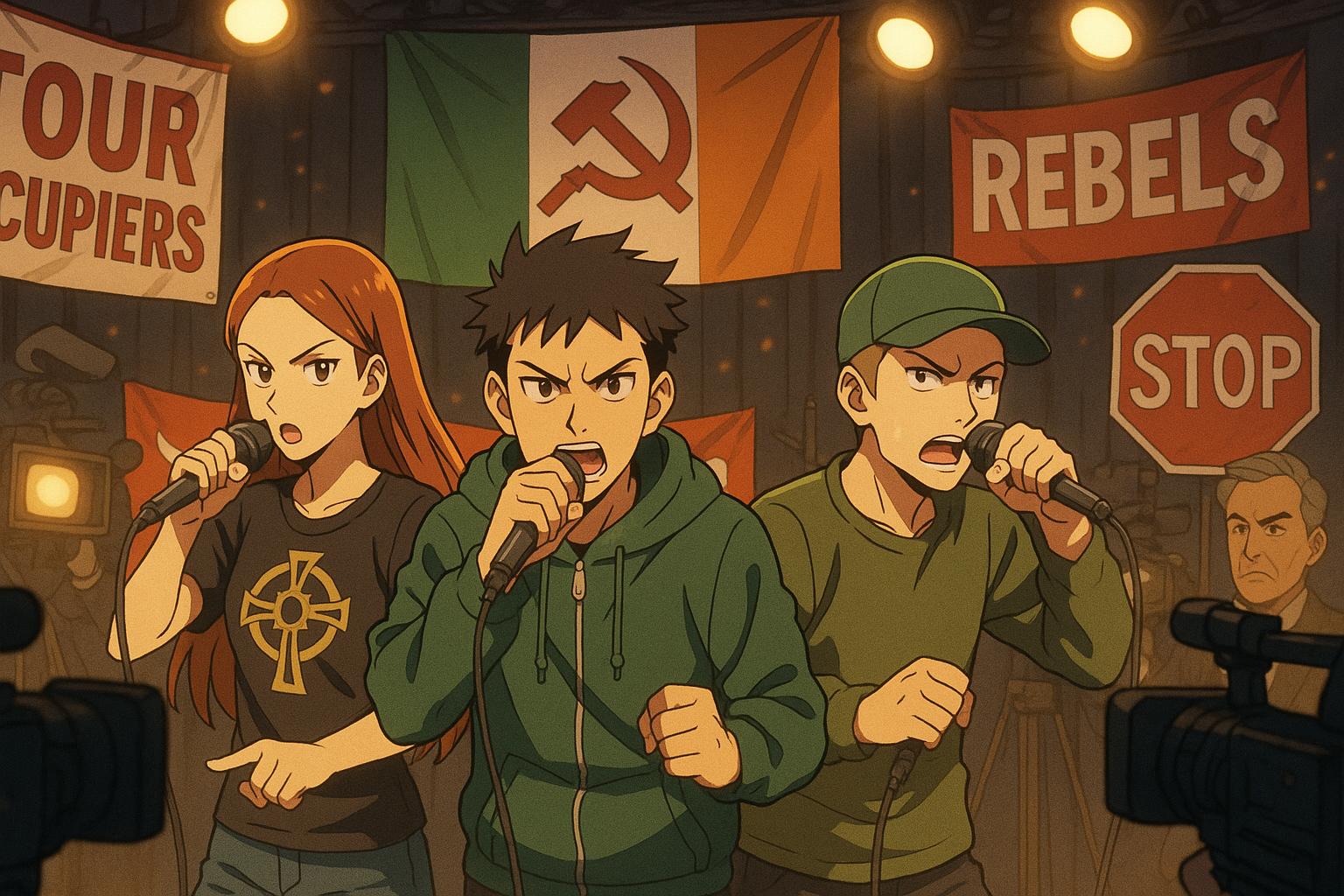Kneecap, the provocative Irish rap trio from Belfast, has once again stirred controversy, particularly after their recent performance at London’s 100 Club. Comprising Mo Chara, DJ Provai, and Moglai Bap, the group is notorious for their politically charged lyrics that not only deride figures from the past such as Margaret Thatcher but also toe the line of promoting divisive sentiments. Their latest antics come in a climate where the nation's political landscape has shifted dramatically, and one must question the appropriateness of such incendiary messaging.
At their recent show, the audience’s raucous chants—“Free Palestine” and mockery of Thatcher—betrayed a reckless disregard for the implications of their rhetoric. Attendees, seemingly unfazed by the ramifications of supporting narratives that can inflame tensions, enthusiastically participated despite the criticism their previous performances have incited. This isn’t a new phenomenon; their earlier appearances, like those at Coachella, faced significant backlash, including censorship and intense media scrutiny.
The legal troubles of Kneecap reached a new level of severity when member Liam Óg Ó hAnnaidh (stage name Mo Chara) was charged under the UK’s Terrorism Act due to a November 2024 incident where he allegedly flaunted a Hezbollah flag during a performance. This has naturally raised alarms among authorities about more than just the legality of their actions; the band's lyrics have been condemned for appearing to glorify terrorist organizations and inciting violence against UK politicians. Despite their insistence that their statements are misinterpreted satire aimed at issues like the ongoing Gaza conflict, it’s hard to overlook the potential for their messaging to incite further division.
Kneecap positions themselves as voices for the disenfranchised within the Irish community, advocating for cultural identity. Yet, their confrontational style threatens to deepen divides rather than foster understanding. Recent performances have compelled them to apologize for remarks perceived as instigating violence, echoing tragic incidents involving MPs like Jo Cox and David Amess. This ongoing dialogue around artistic freedom versus responsible political expression raises essential questions about the fine line artists tread when commenting on serious socio-political issues.
Condemnation from political figures has been fierce, with voices like Shadow Secretary of State for Justice Robert Jenrick and former Tory leader Iain Duncan Smith questioning the appropriateness of platforms for acts like Kneecap. They argue that promoting glorified terrorism should preclude any consideration for public performances at respected venues. Critics assert that the band lacks true musical merit and instead relies on shock tactics, a strategy that many believe will ultimately lead to their decline.
Despite the backlash, Kneecap's supporters argue their music taps into a well of resistance and identity, particularly among younger Irish and leftist audiences. Their unique blend of satire, defiance, and direct political commentary is reminiscent of the rebellious echoes of punk legends like the Sex Pistols, albeit with a dangerously provocative edge. Nonetheless, they face increasing scrutiny as accusations mount regarding their tendency to trivialize serious geopolitical dilemmas.
As Kneecap gears up for their upcoming performance at the Glastonbury Festival amid mounting controversy, their future hangs in the balance. They continue to assert that their artistic expression bravely confronts societal complacency and invites discussions about global injustices. However, their mix of satire and activism begs critical examination of whether free expression can remain uninhibited in our increasingly polarized climate. Their journey from local acts to international provocateurs shines a spotlight on the complexities of merging cultural pride with incendiary political statements, leaving the public to speculate whether such tactics will cement their standing in the music scene or drive them into obscurity.
Source: Noah Wire Services
